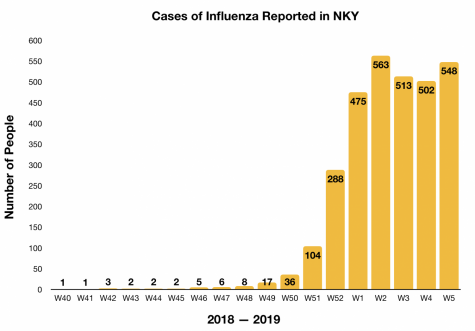Your donation will support the student journalists of Northern Kentucky University. Your contribution will allow us to purchase equipment and cover our annual website hosting costs.
Health, Counseling and Student wellness offers flu vaccines which can be covered by insurance.
Flu season’s here: how you can stay well
February 18, 2019
You start your day off making breakfast. You open the fridge, close some cabinets and play music on your phone. Afterward, you drive to class. There, you open the door, type on your laptop and share your pencil with a friend.
When you get home later in the evening, your body aches, accompanied with chills, sweats and a headache. Eventually, you go to the doctor and get tested positive for the flu, but you have no idea where you got it from.
College students can be at higher risk for the flu, since students typically live in close quarters with one another, congregate in similar locations and may have weaker immune systems from lack of sleep, said both nursing faculty Jennifer Hunter and Rose Tempel, associate director of Health, Counseling & Student Wellness.
The flu, or influenza virus, is spread through airborne droplets that are made when people sneeze, cough and/or talk. It can also spread through contaminated surfaces, such as door handles, keyboards, countertops and more.
The Northern Kentucky Health Department reported that there have been 1,953 reported cases of the flu in the 2018-2019 season, ranging from September to May.
The flu infects millions of people each year. With four types of flu, 16 strains and a virus that is constantly evolving, the flu is one illness that is impossible to eradicate. However, preventative measures can be taken to reduce contagion.

Data gathered from the Centers for Disease Control and Prevention.
Symptoms
Symptoms of the flu can include fever, headache, coughing, sneezing, muscle and body aches, fatigue, chills and sweats.
Although the common cold and the flu have similar symptoms, Hunter said the flu affects your whole body more—specifically the respiratory system.
Hunter said, while some people do have a fever with the flu, that alone cannot be used to determine if a person has the flu.
“You can’t count on fever as being the sole determiner because some people will be positive for flu and have not one single degree of a fever, so you can’t use fever as a distinguishing factor,” Hunter said.
Symptoms might not show up right away if you’re exposed to the virus. However, you’re still contagious during that period and may be passing the virus off to others, without knowing.
Prevention and cure
Zack Raney, epidemiology manager at the Northern Kentucky Health Department, said the easiest way to prevent the flu is by washing your hands.
“It can help you prevent getting the flu. The flu could be on a commonly touched surface or something like that,” Raney said. “So, if you’re washing your hands before you eat or before you prepare food, you can help prevent your body from ever even being introduced to the flu virus.”
Along with handwashing, the flu vaccine can help prevent, or help you fight the flu more effectively if you do get it.

Victor faces his fear of needles.
“Our best advice against the flu is going to be vaccination, making sure you get that shot early in the season,” Raney said. “And, even if you haven’t got it already this season, it’s really important to go ahead and get it because with that vaccination—if it’s well matched with the strains circulating—it can prevent you from getting the flu that year.”
At NKU, health, counseling and student wellness offers flu vaccines that may be covered by insurance, or a low out-of-pocket fee. Tempel said they’ve given out around 600 vaccines this flu season.
If you do get the flu, Hunter said it’s important to stay hydrated, eat and avoid being around other people to prevent it from spreading. If someone in your dorm, apartment or house has the flu, Hunter said wiping down hard surfaces with disinfectant wipes can help prevent contagion.
Antivirals, like TamiFlu, can be taken within 48 hours of symptoms showing up, said Tempel. Rather than cure the flu, antivirals only shorten the duration of the illness, so in order for them to be effective, they must be taken as soon as possible. Over-the-counter medications, such as Tylenol or ibuprofen, can also be taken to alleviate symptoms of the flu.
“We’re recommending anyone that has the flu to try to stay away from other people or other crowds as much as possible,” Raney said. “Definitely go in and see a doctor as soon as you can. And then it’ll be up to the physician whether or not they decided to treat [the flu].”
Education
Each week, the Northern Kentucky Health Department tracks and monitors the flu. Raney said the health department communicates with community partners, such as local doctors, hospitals or long term care facilities.

Health, Counseling and Student wellness has given out around 600 vaccines this flu season.
“We’re always trying to update on where the flu season’s at, what the best preventative and control measures are for those facilities and what the recommendations are from us or the CDC on how to fight or handle the flu that year,” Raney said.
Tempel receives a weekly update from the health department because she is a healthcare provider. On campus, there’s hand sanitizer available for people to use to kill germs.
Hunter said, despite what people may think, it’s not possible to get the flu from getting a flu vaccine.
“It’s what’s called an antigen and it acts like a live virus,” Hunter said. “It goes into your system and your immune system says ‘oh, alert, alert, here’s the flu vaccine’ and starts building up all this immunity and the antibodies to the flu virus, when it’s really not the flu virus.”
Hunter said it’s important to get vaccinated yearly to prevent the flu, as the flu constantly mutates and changes itself.
“It’s just something that’s been around in our universe and will continue to be around. Flu will never be eradicated because it constantly mutates—the genes do,” Hunter said. “Its purpose is to stay alive and that’s why you’ll see mutations of it.”

